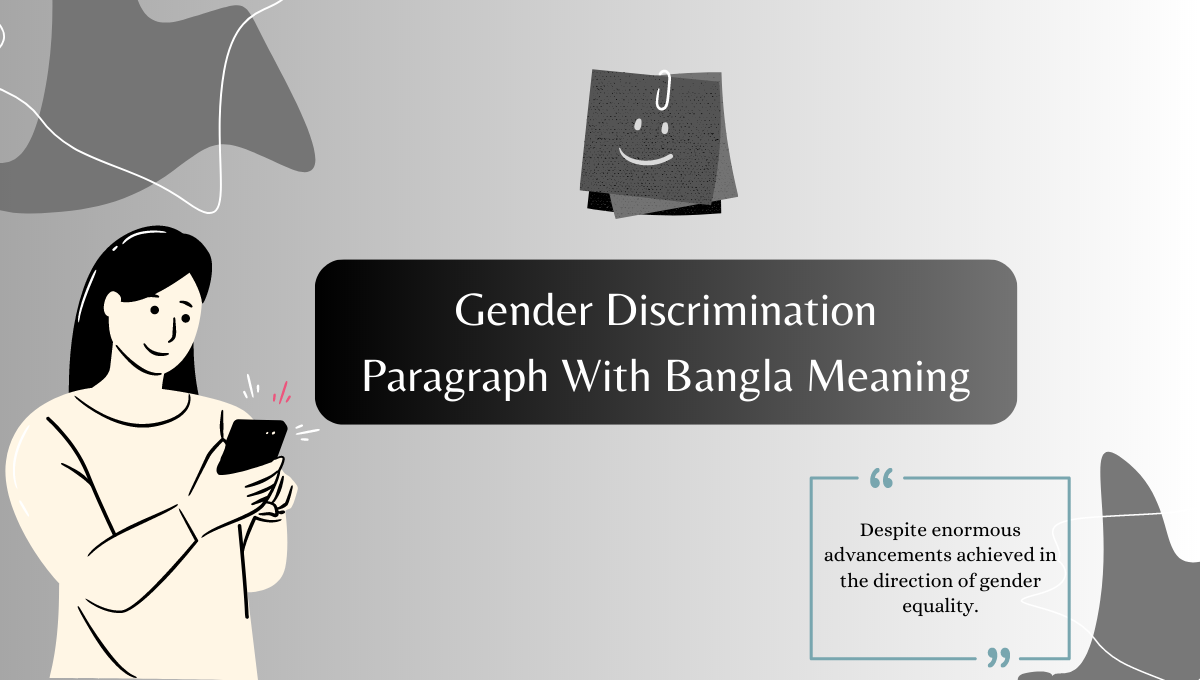Despite enormous advancements achieved in the direction of gender equality, gender discrimination continues to be a problem in communities all over the world. This institutionalized discrimination against people based on their gender continues to impede social advancement, constrict opportunities, and strengthen inequality. The numerous forms of gender discrimination, their effects on people and communities, and the ongoing initiatives to end this injustice will all be covered in this article.
Social conventions, preconceptions, and unequal power dynamics all play a significant role in the persistence of gender discrimination. It takes many different forms and, while it affects men and women differently, it does it in varied ways. The unequal access to possibilities for education and work is one component of gender discrimination that is frequently present.
Women have historically encountered obstacles to seeking education and entering the workforce, which has resulted in limited employment opportunities and economic reliance. The gender wage disparity is also still present, and occupational segregation still exists, with some occupations being predominately held by one gender and excluding the other.
Furthermore, unfair treatment at work is another common manifestation of gender discrimination. Women still encounter issues like unequal compensation, few possibilities for job progression, and biases in hiring and promotion procedures. In addition to sabotaging human potential, this also prevents economic growth by depriving society of a variety of viewpoints and skills.
The worlds of politics and decision-making are likewise affected by gender prejudice. In positions of authority, such as those in the government, corporate boards, and other leadership positions, women are frequently underrepresented. In addition to denying women a voice in setting agendas and policies, this underrepresentation makes it more difficult to implement gender-responsive policies that take into account the interests and concerns of all people.
Along with these socioeconomic factors, gender discrimination can negatively impact someone’s physical and emotional health. Women and girls are disproportionately affected by gender-based violence, which includes sexual assault, domestic abuse, and harassment. A culture of silence and impunity is further supported by the fear of violence and the difficulty in accessing justice. Men may have particular difficulties since inflexible gender norms may prevent them from seeking assistance or showing weakness when subjected to abuse or prejudice.
The fight against gender discrimination has picked up steam recently. In order to achieve gender equality, advocacy groups, international organizations, and governments have been enacting new laws, raising public knowledge of existing laws, and reforming existing ones to better safeguard all people’s rights, regardless of gender. HeForShe and #MeToo movements have inspired discussions that question conventional wisdom and give people the confidence to speak out against injustice while also bringing attention to how ubiquitous gender discrimination is.
Gender prejudice must be addressed, and education and awareness are essential. We can impart respect, empathy, and equality principles early on by advocating gender equality in school curricula and encouraging inclusive learning settings. Boys and men must be encouraged to join the fight against gender inequality as allies, challenging negative stereotypes and advancing gender equality in their local communities.
In conclusion, creating a just and equal society continues to be significantly hampered by gender discrimination. It has an impact on people in many other areas of their lives, restricting opportunities, maintaining prejudices, and maintaining social and economic inequality. We can, however, break the chains of gender discrimination and create a future where people are recognized and respected for their talents, abilities, and goals, regardless of their gender, with coordinated efforts, such as governmental reforms, educational programmed, and public awareness.
Inequality in remuneration for equivalent work, less job chances, gender-based prejudices that restrict people’s options and potential, and unequal family and caregiving obligations are just a few of the ways that gender discrimination can take many different forms.
বাংলা অনুবাদ
লিঙ্গ সমতার দিক থেকে প্রচুর অগ্রগতি অর্জিত হওয়া সত্ত্বেও, লিঙ্গ বৈষম্য সারা বিশ্বের সম্প্রদায়গুলিতে একটি সমস্যা হিসাবে অব্যাহত রয়েছে। লিঙ্গের উপর ভিত্তি করে মানুষের প্রতি এই প্রাতিষ্ঠানিক বৈষম্য সামাজিক অগ্রগতিতে প্রতিবন্ধকতা, সুযোগ সংকুচিত করে এবং বৈষম্যকে শক্তিশালী করে। লিঙ্গ বৈষম্যের অসংখ্য রূপ, মানুষ এবং সম্প্রদায়ের উপর তাদের প্রভাব এবং এই অবিচারের অবসানের জন্য চলমান উদ্যোগগুলি এই নিবন্ধে অন্তর্ভুক্ত করা হবে।
সামাজিক প্রথা, পূর্ব ধারণা এবং অসম শক্তির গতিশীলতা সবই লিঙ্গ বৈষম্যের স্থায়িত্বে গুরুত্বপূর্ণ ভূমিকা পালন করে। এটি অনেকগুলি ভিন্ন রূপ নেয় এবং এটি পুরুষ এবং মহিলাদেরকে ভিন্নভাবে প্রভাবিত করে, এটি বিভিন্ন উপায়ে করে। শিক্ষা এবং কাজের জন্য সম্ভাবনার অসম অ্যাক্সেস লিঙ্গ বৈষম্যের একটি উপাদান যা প্রায়শই উপস্থিত থাকে।
নারীরা ঐতিহাসিকভাবে শিক্ষা অর্জন এবং কর্মক্ষেত্রে প্রবেশের ক্ষেত্রে বাধার সম্মুখীন হয়েছে, যার ফলে সীমিত কর্মসংস্থানের সুযোগ এবং অর্থনৈতিক নির্ভরতা হয়েছে। লিঙ্গ মজুরি বৈষম্য এখনও বিদ্যমান, এবং পেশাগত পৃথকীকরণ এখনও বিদ্যমান, কিছু পেশা প্রধানত একটি লিঙ্গ দ্বারা অনুষ্ঠিত হয় এবং অন্যটি বাদ দিয়ে।
অধিকন্তু, কর্মক্ষেত্রে অন্যায় আচরণ লিঙ্গ বৈষম্যের আরেকটি সাধারণ প্রকাশ। মহিলারা এখনও অসম ক্ষতিপূরণ, চাকরিতে অগ্রগতির সামান্য সম্ভাবনা এবং নিয়োগ ও পদোন্নতির পদ্ধতিতে পক্ষপাতিত্বের মতো সমস্যার সম্মুখীন হন। মানুষের সম্ভাবনাকে ধ্বংস করার পাশাপাশি, এটি সমাজকে বিভিন্ন দৃষ্টিভঙ্গি এবং দক্ষতা থেকে বঞ্চিত করে অর্থনৈতিক প্রবৃদ্ধিকে বাধা দেয়।
রাজনীতি এবং সিদ্ধান্ত গ্রহণের জগতগুলিও একইভাবে লিঙ্গ কুসংস্কার দ্বারা প্রভাবিত। কর্তৃপক্ষের পদে, যেমন সরকার, কর্পোরেট বোর্ড এবং অন্যান্য নেতৃত্বের পদে, মহিলাদের প্রায়শই কম প্রতিনিধিত্ব করা হয়। এজেন্ডা এবং নীতি নির্ধারণে নারীদের একটি কণ্ঠস্বর অস্বীকার করার পাশাপাশি, এই নিম্ন-উপস্থিতকরণ লিঙ্গ-প্রতিক্রিয়াশীল নীতিগুলি বাস্তবায়ন করা আরও কঠিন করে তোলে যা সমস্ত মানুষের স্বার্থ এবং উদ্বেগকে বিবেচনা করে।
এই আর্থ-সামাজিক কারণগুলির পাশাপাশি, লিঙ্গ বৈষম্য কারও শারীরিক এবং মানসিক স্বাস্থ্যের উপর নেতিবাচক প্রভাব ফেলতে পারে। নারী ও মেয়েরা লিঙ্গ-ভিত্তিক সহিংসতার দ্বারা অসমভাবে প্রভাবিত হয়, যার মধ্যে রয়েছে যৌন নিপীড়ন, গার্হস্থ্য নির্যাতন এবং হয়রানি। নীরবতা এবং দায়মুক্তির সংস্কৃতি সহিংসতার ভয় এবং ন্যায়বিচার পাওয়ার ক্ষেত্রে অসুবিধা দ্বারা আরও সমর্থিত হয়। পুরুষদের বিশেষ অসুবিধা হতে পারে কারণ অনমনীয় লিঙ্গ নিয়ম তাদের সাহায্য চাওয়া বা দুর্বলতা দেখাতে বাধা দিতে পারে যখন তারা নির্যাতন বা কুসংস্কারের শিকার হয়।
লিঙ্গ বৈষম্যের বিরুদ্ধে লড়াই সম্প্রতি বাষ্প তুলেছে। লিঙ্গ সমতা অর্জনের জন্য, অ্যাডভোকেসি গ্রুপ, আন্তর্জাতিক সংস্থা এবং সরকারগুলি নতুন আইন প্রণয়ন করছে, বিদ্যমান আইন সম্পর্কে জনসাধারণের জ্ঞান বৃদ্ধি করছে এবং লিঙ্গ নির্বিশেষে সকল মানুষের অধিকারকে আরও ভালভাবে রক্ষা করার জন্য বিদ্যমান আইনগুলির সংস্কার করছে। HeForShe এবং #MeToo আন্দোলনগুলি এমন আলোচনাগুলিকে অনুপ্রাণিত করেছে যা প্রচলিত প্রজ্ঞাকে প্রশ্নবিদ্ধ করে এবং মানুষকে অন্যায়ের বিরুদ্ধে কথা বলার আত্মবিশ্বাস দেয় এবং সেইসঙ্গে লিঙ্গ বৈষম্য কতটা সর্বব্যাপী তা মনোযোগ দেয়৷
লিঙ্গগত কুসংস্কার অবশ্যই মোকাবেলা করতে হবে, এবং শিক্ষা ও সচেতনতা অপরিহার্য। আমরা স্কুল পাঠ্যক্রমে লিঙ্গ সমতাকে সমর্থন করে এবং অন্তর্ভুক্তিমূলক শিক্ষার সেটিংসকে উত্সাহিত করার মাধ্যমে প্রাথমিকভাবে সম্মান, সহানুভূতি এবং সমতা নীতি প্রদান করতে পারি। ছেলে এবং পুরুষদের অবশ্যই লিঙ্গ বৈষম্যের বিরুদ্ধে লড়াইয়ে সহযোগী হিসাবে যোগদান করতে উত্সাহিত করতে হবে, নেতিবাচক স্টেরিওটাইপকে চ্যালেঞ্জ করে এবং তাদের স্থানীয় সম্প্রদায়ে লিঙ্গ সমতাকে এগিয়ে নিয়ে যেতে।
উপসংহারে, লিঙ্গ বৈষম্য দ্বারা একটি ন্যায়সঙ্গত ও সমান সমাজ গঠন উল্লেখযোগ্যভাবে বাধাগ্রস্ত হচ্ছে। এটি তাদের জীবনের অন্যান্য অনেক ক্ষেত্রে মানুষের উপর প্রভাব ফেলে, সুযোগ সীমাবদ্ধ করে, কুসংস্কার বজায় রাখে এবং সামাজিক ও অর্থনৈতিক বৈষম্য বজায় রাখে। যাইহোক, আমরা লিঙ্গ বৈষম্যের শৃঙ্খল ভেঙ্গে একটি ভবিষ্যত তৈরি করতে পারি যেখানে মানুষ তাদের প্রতিভা, যোগ্যতা এবং লক্ষ্যের জন্য স্বীকৃত এবং সম্মানিত হয়, তাদের লিঙ্গ নির্বিশেষে, সমন্বিত প্রচেষ্টা যেমন সরকারি সংস্কার, শিক্ষামূলক কর্মসূচি এবং জনসচেতনতা। .
সমতুল্য কাজের জন্য পারিশ্রমিকের অসমতা, কাজের সুযোগ কম, লিঙ্গ-ভিত্তিক কুসংস্কার যা মানুষের বিকল্প এবং সম্ভাবনাকে সীমাবদ্ধ করে, এবং অসম পরিবার এবং যত্ন নেওয়ার বাধ্যবাধকতাগুলি হল কয়েকটি উপায় যে লিঙ্গ বৈষম্য বিভিন্ন রূপ নিতে পারে।
গুরুত্ব পূর্ণ শব্দের অর্থ
important word list:
Gender equality – লিঙ্গ সমতা (Ling shomota),Gender discrimination – লিঙ্গ নির্মূলন (Ling nirmulon),Social advancement – সামাজিক উন্নতি (Samajik unnati),Inequality – অসমতা (Osomota),Institutionalized discrimination – প্রতিষ্ঠানিক বিভেদ (Protishthonik bibhed),Preconceptions – পূর্বাভাস (Purbabhash),Unequal power dynamics – অসমান ক্ষমতা গতি (Osoman kshomota goti),Access to opportunities – সুযোগের অ্যাক্সেস (Suyoger access),Gender wage disparity – লিঙ্গ মঞ্চ অসমতা (Ling moncho osomota),Occupational segregation – পেশাগত পৃথকীকরণ (Peshagot prithokikoron),Unfair treatment – অসম্পর্কমূলক ব্যবহার (Osomporokmulk byabohar),Biases – পক্ষপাত (Pokshapat),Underrepresentation – অপ্রতিস্থানীকরণ (Apratisthanikoron),Gender-based violence – লিঙ্গ ভিত্তিক সংঘটনা (Ling bhitik songhota),Impunity – তর্কহীনতা (Torkohinota),Advocacy groups – প্রচার-প্রতিনিধি দল (Prochar-pratinidhi dol),International organizations – আন্তর্জাতিক সংগঠন (Antorjatik songoton),Laws – আইন (Ain),Reforms – সংশোধন ,(Songshodhon),Gender-responsive policies – লিঙ্গ প্রতিসাধক নীতিসমূহ (Ling protishadhok nitisomuho্Inclusive learning settings – সমাবেশ শিক্ষা স্থাপন (Samabesh shiksha sthapan),Allies – মিত্রদল (Mitrondol),Negative stereotypes – মন্দ ধারণা (Mondo dharona),Coordinated efforts – সমন্বিত প্রচেষ্টা (Somonbit prochesta),Public awareness – জনচেতনা (Jonochetona)

